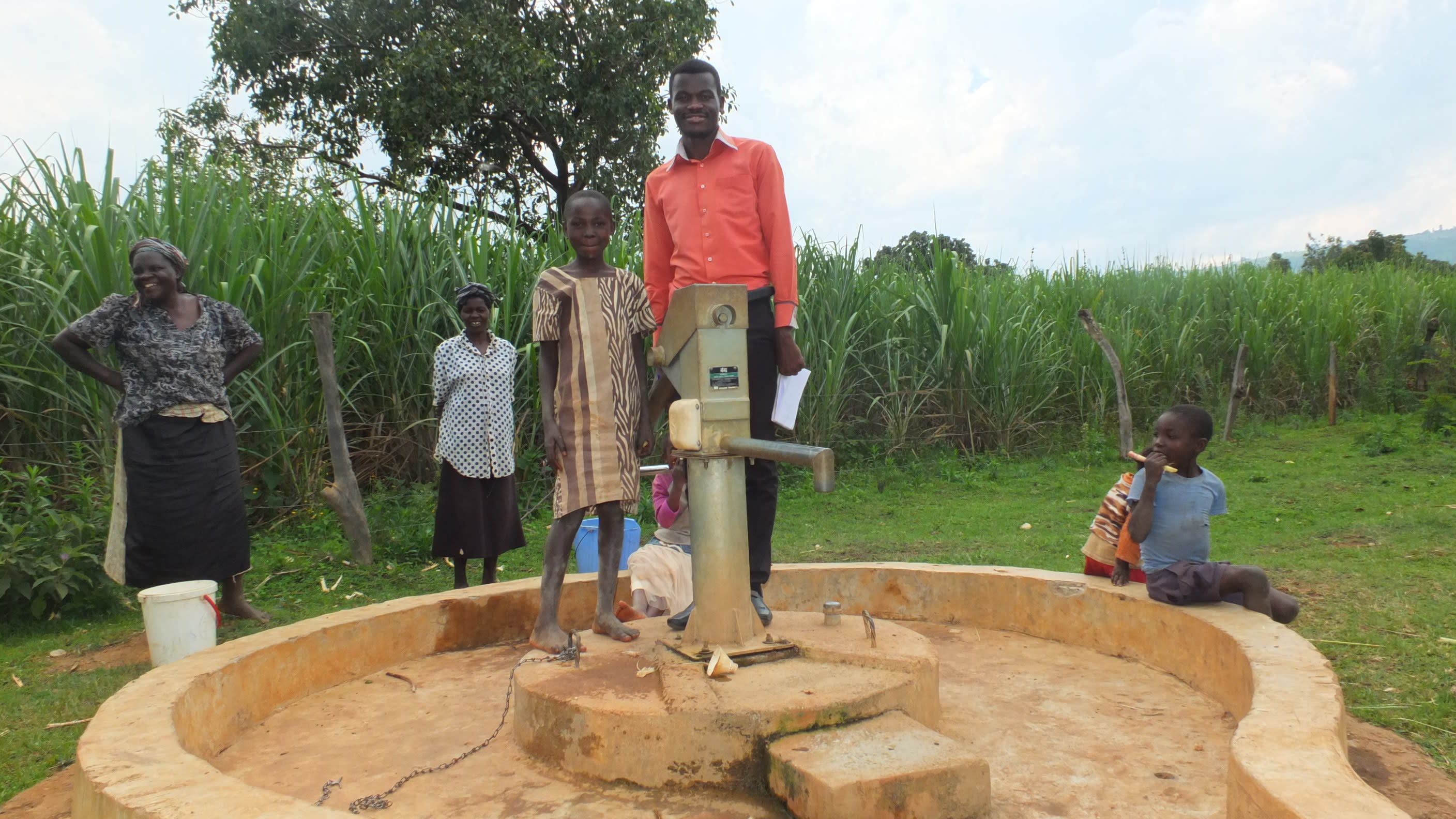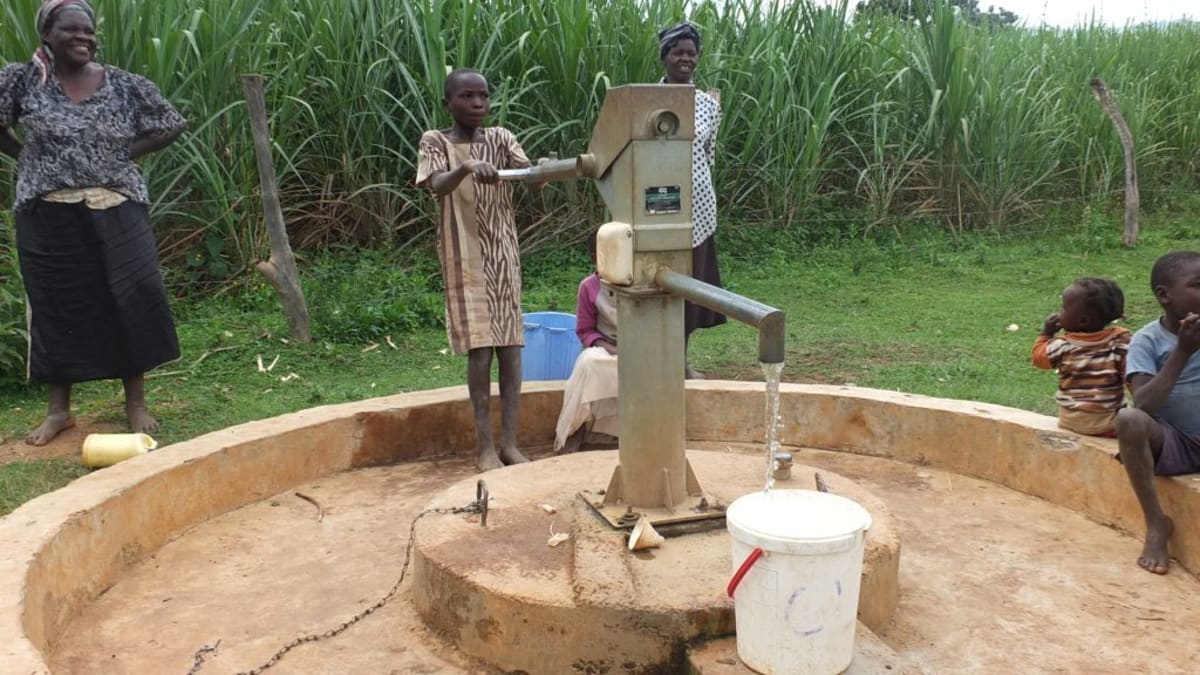This project is a part of our shared program with Safe Water and Sustainable Hygiene Initiative (SAWASHI). Our team is pleased to directly share the below report (edited for clarity, as needed).
Background Information
Kimanget Village is located in Kimanget Location, East Kabras Division, Malava Sub-County of Kakamega North County. There are approximately 20 different households with five to eight family members each. These families rely on small scale farming of maize and sugarcane.
As in most communities, the woman's responsibilities are domestic chores and child-rearing, while the man's responsibility is to provide food. One of the most important daily chores of a mother or girl child is to fetch water regardless of time taken, distance traveled, or water quality.
In 1999, a hand-dug well was built by the Kenya Finland Company in order to reduce the distance walked for water, and to reduce the cases of waterborne diseases in the village. Unfortunately the well's hand pump was vandalized in 2006.
The community members were forced to break the well pad to access water with a rope and bucket. Since the well is now open, it is contaminated both by natural and human activities. After drinking the well's dirtied water, disease has been on the rise. The community is asking for help with installing a new hand pump.
Current Water Source
The community uses this contaminated borehole as their only water source. This water is used for drinking, cooking, cleaning, and farming.
Hygiene and Sanitation
A large percentage of the population has been suffering from waterborne disease, with children and the elderly especially susceptible to typhoid and diarrhea.
Only a few compounds have installed sanitation facilities like dish racks, clotheslines, and compost pits.
There is a need for training to change ignorance and negative attitudes about good hygiene. Training will deal with proper hand-washing, food preparation and handling, water storage, and personal hygiene.
Water Committee
The community has come together and elected a group of strong people to act as a Water Committee. This committee will oversee the rehabilitated well's management and maintenance.
Hygiene and Sanitation Training
The implementation of this project included the local government administration who supported fully on the ground.
Training was organized through the help of local government administration, who ensured that at least one member of every household attended. Participants gathered at the old well for on site, interactive training sessions. These sessions were held over the course of three days: two days for hygiene and sanitation topics, and one day to form and educate a water user committee. It was observed that a total of nine men and eight women attended each day. The facilitator was also impressed with their enthusiasm participating with each other during activities and discussions. Sometimes women tend to be more engaged than men, for communities are often influenced by the belief that women are the only ones responsible for their family's health and water situation. However, the training facilitator was pleasantly surprised that both men and women participated in the sessions and plan to practice what they learned.
Posters functioned as the main teaching tool, illustrating both good and bad behaviors related to personal and environmental hygiene. The facilitator lectured on these and also passed them out to participants, letting them identify and discuss what the observed.
Topics covered during training were:
- Proper food preparation and storage
- Developing positive attitudes and hygiene and sanitation
- Waterborne diseases and their prevention
- General environmental health
- Hand-washing techniques
After training, community members were optimistic, promising to change their behavior and begin practicing good hygiene and sanitation. Men as well as the women will be responsible for checking the current hygiene status in their households. They will then make needed improvements together. "In my home we have been washing hands without soap in one basin, since we now know the risks of not washing hands with soap, we will wash our hands with soap and running water," says the caretaker of the water well, Mr. Mandila Kofia.
A visit will be made after a period of three months to assess hygiene and sanitation practices. The water user committee was formed and strengthened so that it can oversee the management and maintenance of this water project. Every member agrees to pay a fee that will be saved in an emergency fund used for well repairs. If the community encounters any more issues, it will be this committee that contacts the water, hygiene and sanitation organization for help.
Project Result: Rehabilitated Hand-Dug Well
A team of four men began construction on January 25. The men started by removing the old well pad in order to prepare it for new plastering. The well cap was put aside to draw water for construction, and was then fixed back on carefully. Workers made sure the cap was reinstalled properly, ensuring there was no gaps that allow for re-contamintation. Sand, water and cement was mixed to make a smooth plaster. After plastering the new well pad, it was left to cure for some days. Workers are prepared to return on February 5 for water quality testing.
During the two construction days, community members helped whenever necessary. They provided constant, day and night security for construction tools and materials. At the end of the project, Mr. Kofia added that he plans to move closer to the well to ensure its constant upkeep and safety: "We have suffered a lot on issue about water, for security purpose of our new pump, one of my sons will build a home near the well."
The Water Project and the people of Kimanget Village Thank You for unlocking potential!
 Protected Dug Well
Protected Dug Well



















